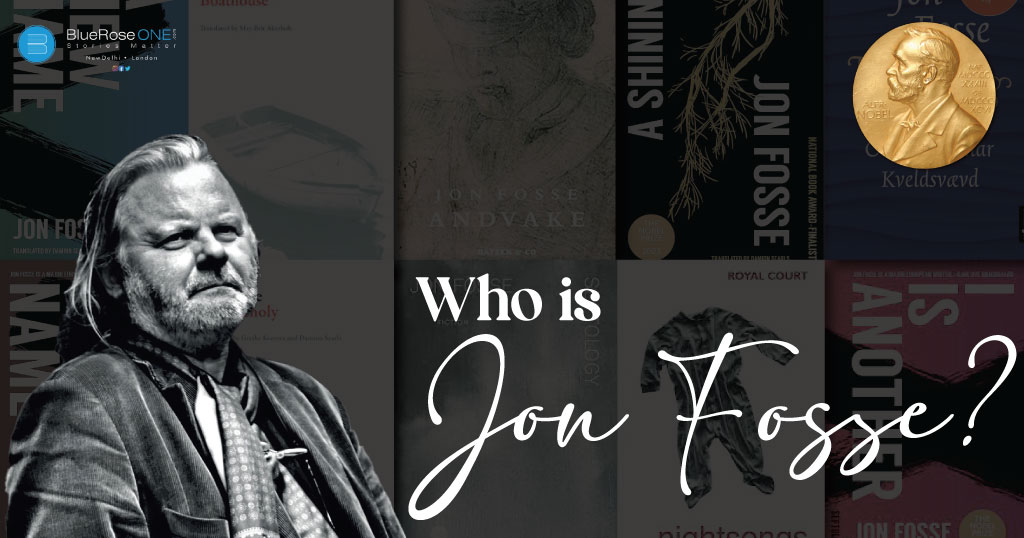In the realm of contemporary literature, few names stand as tall as Jon Fosse, a Norwegian playwright and novelist whose contributions to the world of letters have earned him the prestigious Nobel Prize in Literature for the year 2023. This blog post aims to delve into the life, works, and impact of Jon Fosse, unravelling the layers of his literary brilliance that culminated in this significant recognition.
Early life and background:
Jon Fosse, born on September 29, 1959, in Haugesund, Norway, emerged from the picturesque backdrop of a small coastal town, an environment that would profoundly shape his literary journey. The essence of Fosse’s early life experiences and the distinctive Norwegian landscape became integral elements of his literary canvas.
Growing up in this close-knit coastal community, Fosse absorbed the cultural nuances and unique heritage of Norway, laying the groundwork for his future artistic endeavors. The small-town setting, with its intimate connections and communal bonds, left an indelible mark on Fosse’s worldview and thematic explorations.
Read: How to Overcome Writer’s Block: 10 Proven Ways to Unlock Your Creativity
The coastal environment, with its rugged landscapes and maritime influences, seeped into the fabric of Fosse’s imagination, offering a rich palette for him to draw upon in his writings. The essence of his Norwegian upbringing permeates his works, contributing to their authenticity and cultural depth.
Fosse’s early life thus serves as a foundational pillar, grounding his literary creations in the distinct textures of his homeland and providing readers with a glimpse into the cultural richness that underpins his acclaimed body of work.
Literary Style and Themes:
Jon Fosse’s literary style stands as a testament to the power of simplicity and the impact it can have on exploring profound aspects of the human condition. His writing is characterised by a spareness that eschews unnecessary embellishments, opting instead for a minimalist approach that allows the core emotions and thoughts to shine through. This stripped-down style is a deliberate choice, emphasising the essence of his narratives and creating a canvas where readers can engage with the subtleties of the human experience.
The minimalist approach in Fosse’s writing serves as a vessel for a deep exploration of existential questions, human relationships, and the intricacies of the mind. By paring down his prose, Fosse creates a space where the reader can immerse themselves in the underlying complexities of his narratives. The simplicity of his language acts as a conduit, drawing readers into the depths of his characters’ emotions and the philosophical inquiries that permeate his works.
One of the central themes that consistently reverberates throughout Fosse’s body of work is the universal yet deeply personal exploration of loneliness, mortality, and the search for meaning. These themes are the emotional bedrock upon which his narratives unfold. Fosse’s characters often grapple with the isolation of existence, confront the inevitability of mortality, and engage in a quest for meaning that transcends cultural boundaries.
Loneliness, as portrayed by Fosse, is not merely a physical state but a profound emotional and existential condition. His characters navigate the vast landscapes of their inner selves, seeking connections that extend beyond the surface level. Fosse’s spare prose allows readers to feel the weight of this loneliness, making it a palpable and relatable aspect of the human experience.
Read: A Complete Guide on How to Make Your Book an International Bestseller and Sell Globally.
Mortality, another recurring motif, is approached with a contemplative lens. Fosse’s characters confront the transience of life, prompting readers to reflect on their own mortality and the fleeting nature of existence. This theme adds a layer of introspection to his works, inviting readers to ponder the significance of their own lives in the face of impermanence.
The search for meaning, perhaps the most existential of themes, is woven intricately into the fabric of Fosse’s narratives. His characters embark on introspective journeys, grappling with the purpose of their lives and the meaning they derive from their experiences. Fosse’s minimalist style allows these explorations to unfold gradually, encouraging readers to engage in a contemplative dialogue with the text.
In essence, Jon Fosse’s literary style, marked by its spareness, acts as a conduit for the exploration of universal themes that resonate deeply on a personal level. His minimalist approach creates a literary space where readers can navigate the complexities of loneliness, mortality, and the search for meaning, making Fosse’s works a poignant and introspective journey into the human soul.
Notable Works:
Fosse’s literary repertoire is extensive and diverse, encompassing plays, novels, essays, and poetry. Some of his most acclaimed works include:
- “Nightsongs” (1987): Fosse’s debut novel, “Nightsongs,” marked the emergence of a significant voice in Norwegian literature. The novel introduces readers to Fosse’s spare and contemplative style, setting the tone for his later works. “Nightsongs” explores the intricate nuances of human relationships and existential questions, themes that become hallmarks of Fosse’s literary exploration. Through this debut, Fosse established himself as a keen observer of the human condition, inviting readers into a world where emotions are subtly layered and introspection is paramount.
- “The Name” (1995): In this novel, Fosse delves into the aftermath of a tragic event within a small community, unravelling the complexities of grief and collective guilt. “The Name” showcases Fosse’s ability to dissect the human psyche with precision and compassion. Through vivid characterizations and a nuanced exploration of emotions, Fosse crafts a narrative that resonates on both a personal and communal level. The novel is a testament to Fosse’s capacity to weave intricate narratives around profound themes, establishing him as a master storyteller.
- The Trilogy: “And Then Comes the Night” (1999): The first installment of Fosse’s trilogy introduces readers to the lives of two couples in a small town. Fosse intricately explores the dynamics of relationships, exposing the vulnerabilities and complexities that underlie seemingly ordinary lives. The novel serves as a captivating introduction to the characters whose journeys unfold across the trilogy.
- Plays: “Someone is Going to Come” (1994): Fosse’s play explores the dynamics of a couple’s relationship when an outsider intrudes upon their isolated existence. The play unfolds with a sense of tension and psychological complexity, delving into themes of trust, desire, and the impact of external forces on intimate connections. Fosse’s theatrical work showcases his ability to convey profound emotions and interpersonal dynamics within the confined space of a stage.
In each of these notable works, Jon Fosse exhibits a mastery of storytelling, a keen understanding of human psychology, and an unwavering commitment to exploring the profound complexities of life through literature.
International Recognition:
Jon Fosse’s literary acclaim extends well beyond the borders of Norway. His works have been translated into numerous languages, garnering widespread recognition and appreciation on the international stage. The translation of Fosse’s novels, plays, and poetry has allowed readers from diverse cultural backgrounds to access and engage with his unique literary voice. Fosse’s ability to capture universal themes and emotions transcends linguistic and cultural barriers, resonating with readers worldwide.
The Nobel Prize in Literature for 2023 further solidifies Fosse’s global standing. This prestigious accolade not only acknowledges his contribution to Norwegian literature but also positions him as a literary giant with a profound impact on a worldwide scale. The international recognition of Fosse’s work reflects the universality of his themes and the depth of his insights into the human experience, making him a figure whose influence extends far beyond the confines of his homeland.
Influence on Contemporary Literature:
Jon Fosse’s minimalist style and his profound exploration of human nature have significantly influenced contemporary literature. Writers and critics alike have acknowledged the subtlety and depth with which Fosse navigates the complexities of the human psyche. His impact is evident in the works of authors who have been inspired by his thematic richness and narrative precision.
Fosse’s minimalist approach, characterised by spare language and contemplative storytelling, has become a hallmark of modern literature. Writers admire his ability to convey profound emotions and existential questions with simplicity, a feat that invites readers to engage more deeply with the nuances of the human condition. Fosse’s influence on contemporary literature lies not only in the themes he explores but also in the manner in which he crafts narratives that are both accessible and profound.
Nobel Prize Acceptance Speech:
In his Nobel Prize acceptance speech, Jon Fosse provided a glimpse into his philosophical outlook on literature and its transcendent power. He highlighted the role of storytelling as a bridge between cultures and individuals, emphasising the empathy and understanding that literature can foster. Fosse’s speech underscored the shared humanity that unites people across the globe, emphasising the potential of literature to transcend geographical and cultural boundaries.
Read: Book Review – Guide to Start a Modelling Career a Book by Jatin Kumar Khirbat.
The speech illuminated Fosse’s vision for the future of literature, suggesting that storytelling can play a crucial role in promoting unity and mutual understanding in an increasingly interconnected world. His acknowledgment of the profound connection between his life experiences, literary endeavours, and the broader human experience reinforced the idea that literature is a powerful force that can resonate on a universal level.
Legacy and Future Impact:
As the latest Nobel laureate in literature, Jon Fosse’s legacy is poised to endure and shape the trajectory of literary exploration. His body of work, marked by its thematic richness and introspective depth, will continue to inspire new generations of writers and readers. Fosse’s influence extends beyond his immediate literary contributions; it lies in the timeless themes he has explored and the emotions he has elicited.
The themes of loneliness, mortality, and the search for meaning that permeate Fosse’s works are universal and timeless, ensuring that his impact will be felt for years to come. The Nobel Prize serves as a testament to the enduring significance of Fosse’s contributions to literature, solidifying his place in the canon of literary giants and ensuring that his work will be studied, appreciated, and celebrated in the years ahead.
Jon Fosse’s narrative thread threads across the fabric of human experience in the tapestry of modern literature. His Nobel Prize in Literature in 2023 not only honours his previous achievements but also attests to his work’s lasting importance. Readers who dig into Fosse’s books and plays embark on an introspective trip guided by a literary genius whose words transcend time and borders.
















